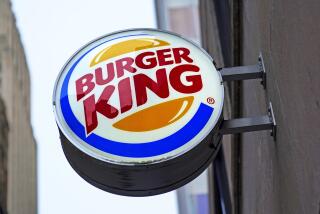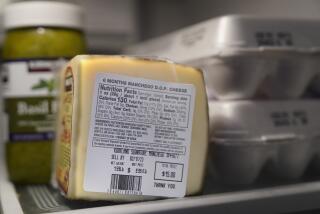Label Genetically <ka-20>Altered Food<ka-0> </ka-0></ka-20>
Corporate giants like Monsanto--which just announced that it has completed a draft of the genetic code of the rice plant--are quick to claim that genetically engineered food will contribute to ending world hunger. Why, then, is there so much industry resistance to labeling their products as genetically modified? All Californians, whether optimist or paranoid, have a right to know whether their food has been genetically engineered.
McDonald’s, Burger King and Kentucky Fried Chicken already are eliminating genetically engineered soy and corn ingredients from their menus in Britain, while Americans keep ordering these foods without a clue to their genetic content.
The California Department of Food and Agriculture reviews and comments on hundreds of corporate applications for genetically modified organisms (foods), or GMOs, without even having a single full-time expert working on the issue.
A new report by the National Academy of Sciences claims that genetically modified food is safe, while in the same breath urging research on the effects on human allergies and whether GMO corn poisons monarch butterflies. This is not a reassuring spin, especially since the leader of the study left midway to go work for the Biotechnology Industry Organization, and four researchers received funding from Monsanto, which has a direct economic interest in crops becoming “Roundup ready,” i.e., tailored for its herbicide.
No one can dispute that genetically engineered food differs from its conventional counterparts. So why not label them to provide consumers with information and choice? They are detectable. Virtually every gene-engineered product carries a signature that gives away its ersatz nature. A simple $5 test can pick out genetically engineered, soy-based products from their natural peers.
We don’t let manufacturers of other products dupe consumers. An unlabeled, knockoff copy of a CD is a fraud. Even atomically identical, man-made and natural diamonds are allowed to be labeled so the consumer can make the choice between the engineered version and the real McCoy. People value the “‘real thing.”
The FDA’s bottom-line argument for not labeling is that engineered and conventional foods are “equivalent.” In fact, no one knows if any food remains identical after it is genetically tampered with. No scientific group, much less the FDA, has thoroughly examined the actual nutritional makeup of any genetically engineered foodstuff. What data we do have is hardly reassuring: The new GMO corn has a toxoid in every kernel. We can only hope it has no deleterious health effects on human consumers. As a result of our Freedom of Information Act requests, we know the FDA, our gatekeeper for food safety, keeps no studies in its files on this corn. There also is evidence of allergic reactions from novel proteins. When the sleep-inducing L-tryptophan was genetically boosted a few years ago, several deaths resulted among unaware consumers.
The fact that no one has noticed that their catsup or spaghetti sauce has been adulterated with genetically engineered tomatoes some years back does not give a federal agency the green light to continue this deception. The FDA already endorses the labeling of irradiated food, organic produce and processed foods. It allows a kosher symbol on properly prepared items. None of these foods differs nutritionally in consistent ways from their conventional counterparts. Nor does the label say they do.
Would a label lead to the destruction of the biotechnology industry? We don’t see why. The biotech industry need not worry about consumer preference if its products are actually as good as they say they are. Consumers are savvy, smart and ultimately fair. They have won the hard-earned right to choose what they want to eat. Many now choose organic or low-fat foods. Others don’t want genetically engineered food. A simple label, now universally recognized in the European Union, that says “contains GMO” should not scare anyone. Mexico’s Senate recently has supported an analogous label. Should not shoppers in California and Mexico have the right to fill their baskets with products they can trust are accurately labeled?
Tell the mom or dad looking for baby food that a label is unneeded. Even Gerber has agreed GMOs have no place in its baby foods. Before other manufacturers are forced to eliminate all genetically engineered products, why not give them the option to label?






